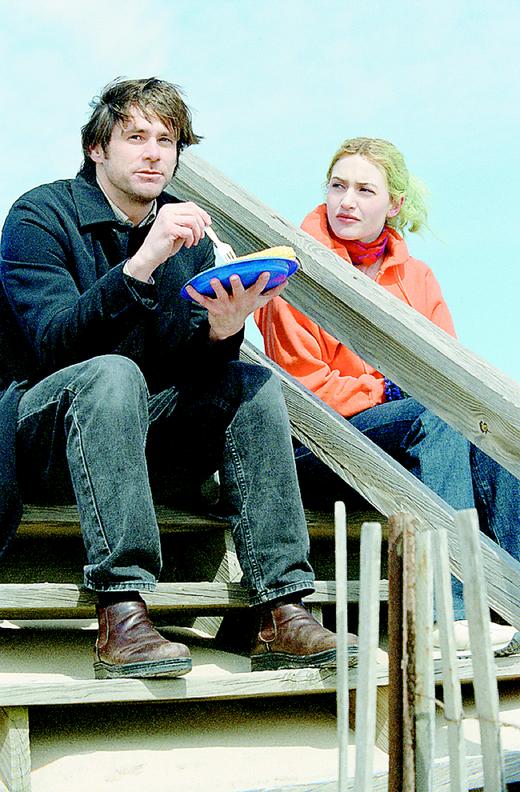The film stars reliable wind-up toy Jim Carrey as Joel, a shy, introverted artist. As you might guess, this isn't the typical hyperactive Carrey role. While the film recalls Carrey's work in the atmospherically similar Truman Show, this is easily the comedian's best acting effort to date. Carrey isn't the only one playing against type either. Titanic's Kate Winslet—usually called upon to play strong, corset-wearing heroines—tackles Clementine, a chaotic, rainbow-haired free spirit with whom Joel falls madly in love. In time, as is the course of a great many relationships, Joel and Clementine break up—torn apart by the assorted differences in their personalities and lifestyles. The twist comes when we find out that Clementine has had all her memories of the affair erased with an experimental procedure pioneered by brainy doc Howard Mierzwiak (The Full Monty's Tom Wilkinson, tossing out another effortless Yank accent).
Broken-hearted and betrayed, Joel opts to have the exact same procedure performed on his brain. But, as a trio of geek-chic computer nerds (Mark Ruffalo, Elijah Wood and Kirsten Dunst) hack into his cerebellum and try to zap out all those pesky memories of love lost, Joel has a change of heart.
At first, losing all those painful thoughts of breakups, arguments and tear-filled fights is a soothing thing. But, as the procedure wears on, travelling backwards in Joel's consciousness, it gets down to erasing Joel's pleasant recollections of first meetings and fresh kisses. Trapped in his own mind, Joel decides he needs to preserve the memory of Clementine. What follows is a madcap mental chase, as Joel tries to squirrel away some scrap of Clementine before she is deleted forever.
The script for Eternal Sunshine is nothing short of brilliant. Though quirky and filled with mental puzzles, it is Kaufman's most accessible, most humane film to date. Despite the strange trappings, this could be one of the most authentic love stories ever made. You'd be hard-pressed to come up with a film that more accurately explores real-life romance—warts and all. Whereas Hollywood usually depicts romance as a wacky meeting of opposites in which light-hearted deception and verbal sparring are only precursors to big public displays of affection, Eternal Sunshine realizes that real love is made up of equal parts contentment, compromise, pleasure and pain. In Hollywood, impediments to love come in the form of fantastical twists like sinking ocean liners and spouses who return from being lost in the jungle for 10 years. In real life, lovers are far more likely to clash over the pettiest of details.
While erasing the memories of a bad breakup sounds like an appealing idea, Eternal Sunshine reminds us that our personalities are made up of all the things that happen to us, good and bad. Erasing the pain of a relationship means erasing the joy of it as well. The film asks us if we would choose to enter a relationship knowing that it would be guaranteed to end in tears and heartbreak. Answer that, and you answer the question “What is love?”
Eternal Sunshine is layered with unexpected events. A series of subplots woven throughout Joel's mind-trip deftly mirror the film's central message and send us through a series of delirious twists. Gondry, meanwhile, creates a wealth of powerful images. Seeing Joel wake up in his bed … on a beach … in the snow is a marvel of visual and emotional dialogue. The science fiction in the film is handled with the lightest of touches and the visual effects are low-key, low-tech. The emphasis is on human emotions here, and all involved—from the pitch-perfect cast to the genius-level filmmakers—prove to be wonderful guides through this unforgettable mental mindscape of bittersweet love.



